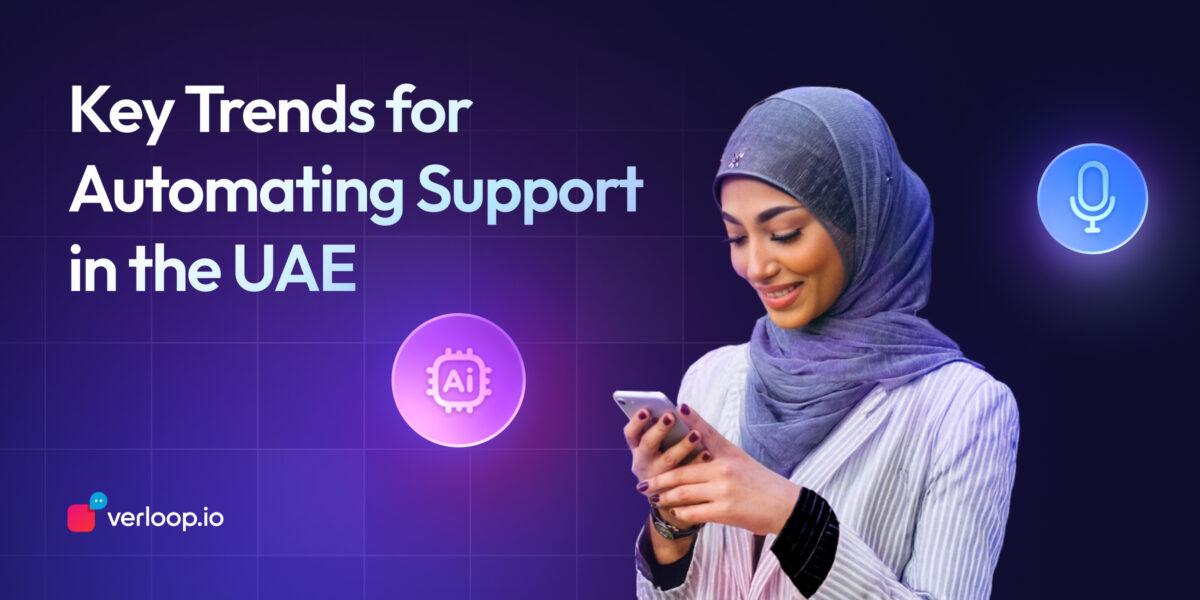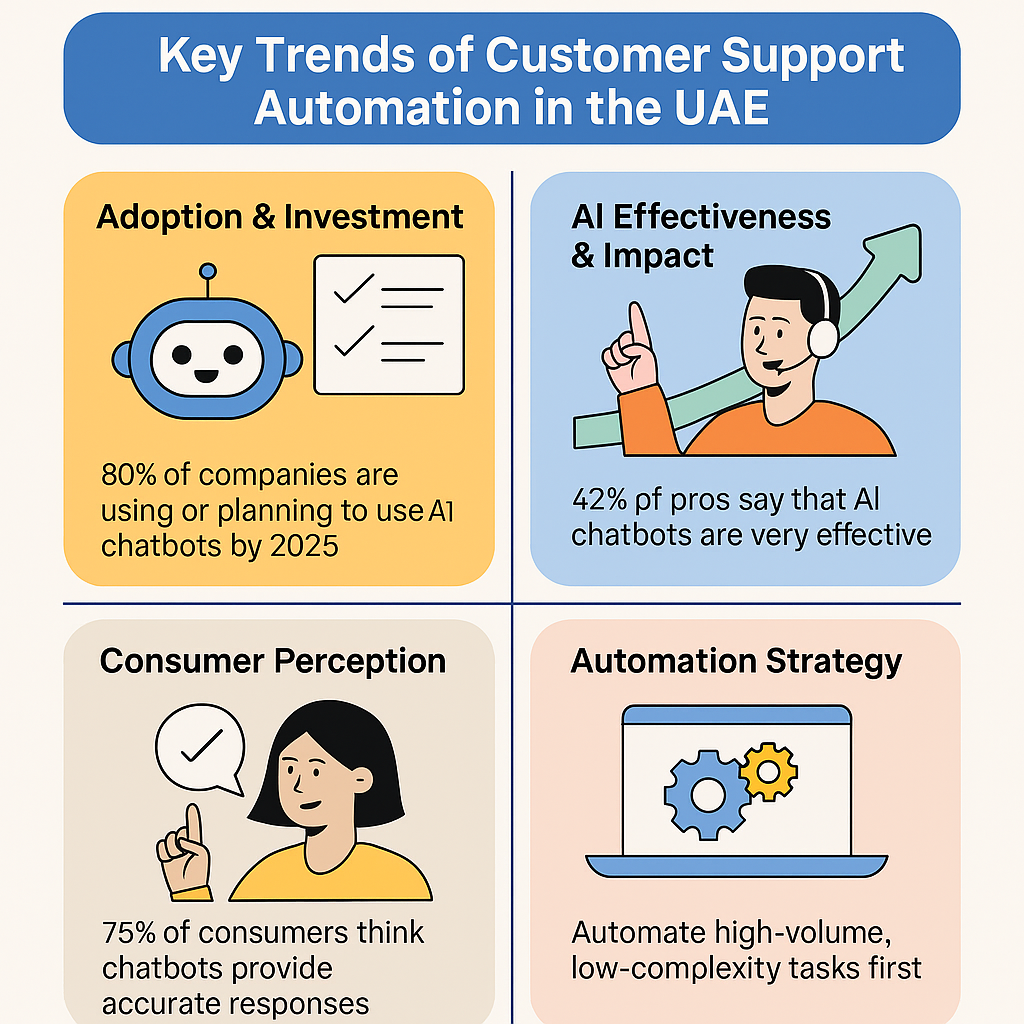Key Trends of Customer Support Automation in the UAE
- September 2nd, 2025 / 5 Mins read
-
Aarti Nair

Key Trends of Customer Support Automation in the UAE
- September 2nd, 2025 / 5 Mins read
-
Aarti Nair
Customer Support Automation Trends in UAE
Think about the last time you contacted a brand for support. Did you wait on hold, or did you get your issue resolved instantly through a chatbot or automated call?
For customers in the UAE, where digital adoption is soaring, the expectation is increasingly clear: fast, personalised, and always-on support.
The UAE has positioned itself as a regional leader in innovation with its Artificial Intelligence Strategy 2031, and customer service is no exception. From banks in Dubai automating loan queries to e-commerce platforms streamlining returns via WhatsApp bots, businesses are already embracing AI-driven solutions to stay ahead.
And the momentum is only growing. With 80% of companies either using or planning to adopt AI-powered chatbots by 2025 and 76% of support teams investing in AI in 2024 (up from 54% in 2023), it’s clear that automation is no longer optional—it’s becoming a competitive necessity.
But here’s the real question: is automation just about cost savings, or is it about building experiences that customers actually value?
In this blog, we’ll explore the key trends driving customer support automation in the UAE, how AI agents and chatbots are reshaping expectations, and what businesses should prioritise to stay ahead in this rapidly evolving landscape.
Key Adoption & Investment Trends in the UAE
The UAE’s vision for digital transformation has always been ambitious, and customer support is quickly becoming one of its most active frontiers. Businesses across banking, retail, travel, and even government services are leaning on automation to manage scale while keeping service levels high.
One of the strongest signals is the pace of investment. In just one year, support team adoption of AI jumped from 54% to 76%, showing how quickly organisations are shifting from experimentation to commitment. And this is only the beginning—83% of decision-makers say they’ll continue to increase their investments in automation over the next 12 months.
This momentum reflects more than cost-cutting. For UAE businesses, automation is about meeting rising customer expectations in real time. With a multilingual population and a highly competitive market, companies that align automation with cultural and contextual understanding stand to build stronger brand loyalty.
In short, automation here isn’t just a back-office tool—it’s becoming a customer-facing differentiator.
AI Effectiveness & Impact on Customer Support
Adopting AI in customer service isn’t just about keeping up with technology—it’s about delivering measurable results. And businesses in the UAE are beginning to see tangible benefits.
Studies show that 42% of customer service professionals find chatbots highly effective in handling requests. These bots can respond instantly, reduce queue times, and provide consistent answers—something traditional call centres struggle with at scale.
For leadership teams, the impact is even clearer. 60% of support leaders expect AI to reduce costs within the next five years, making automation one of the most reliable levers for operational efficiency. But it’s not just about saving money—it’s about creating better experiences. In fact, 73% of customers believe AI will actually improve service quality, and 80% of consumers already find bots helpful for resolving simple issues like order tracking, FAQs, and appointment scheduling.
For UAE businesses, where service standards are exceptionally high and customers are used to quick turnarounds, this effectiveness translates into a competitive edge. Faster responses, better accuracy, and round-the-clock availability mean companies can strengthen customer trust while keeping operational costs under control.
Consumer Perceptions of AI in Customer Service
While AI is proving effective, how do customers actually feel about it?
The answer is mixed, and businesses in the UAE need to pay attention to these nuances to design the right balance between automation and human touch.
Accuracy inspires confidence: Around 75% of consumers believe chatbots provide the right answers. This shows growing trust in AI for everyday interactions.
Human preference persists: Despite this trust, 71% of consumers still prefer speaking with a human agent when the issue feels complex or emotional. This underscores the importance of seamless human handover in automation strategies.
AI is shaping buying behaviour: 40% of consumers believe AI agents will change how they buy from brands, influencing everything from product discovery to transaction completion.
For the UAE, these perceptions are especially important given the region’s diverse customer base. With residents coming from multiple linguistic and cultural backgrounds, businesses must design AI experiences that feel natural and empathetic. That means not just deploying automation, but also ensuring it can adapt across dialects, languages, and customer expectations.
In short, consumers are ready for AI—but they want it to be smart, culturally aware, and supported by humans when it matters most.
Strategic Insights for UAE Businesses
The conversation around automation in customer support has often focused on cost reduction. But in the UAE, where customer experience is a competitive battleground, businesses are realising that the true value of AI lies far beyond cost savings.
Here’s how leading organisations are strategically using automation:
Personalisation at scale
AI agents can analyse customer data in real time, enabling brands to tailor recommendations and responses. For instance, an airline in Dubai could suggest flight upgrades based on a customer’s past travel history—all within the chat itself.
Faster response times
Instant answers to FAQs and routine requests mean agents can focus on high-value conversations. This reduces wait times, which is critical in a market where customers expect service in minutes, not hours.
Predictive support
Instead of reacting to issues, AI can anticipate customer needs. Imagine a telecom provider alerting a customer about unusual data usage before they call in with a complaint.
For UAE businesses, these insights highlight a shift: automation is not just a support tool, but a strategic enabler of loyalty and growth. Those that adopt AI with the goal of enhancing customer experiences—rather than just reducing overhead—will see the biggest long-term gains.
Automation Strategy: Where to Begin
For UAE businesses, the path to automation can feel overwhelming. With so many tools, channels, and customer needs to consider, where should you actually start? The key is to begin small, focus on high-impact areas, and expand steadily.
Here are four pillars to guide your automation journey:
Channel Selection
Start where your customers already are. In the UAE, WhatsApp, live chat, and email remain dominant, but Voice AI is quickly gaining traction. Automating across multiple channels ensures that no matter how customers reach out, they receive consistent, reliable support.
Use Case Mapping
Focus first on high-volume, low-complexity tasks. Common examples include FAQs, order tracking, password resets, and appointment scheduling. These interactions make up a large share of requests and can be automated without compromising customer experience.
Tool Integration
Automation works best when it’s connected. Linking your AI agent with your CRM, helpdesk, or analytics platform means your bot doesn’t just respond—it responds with context. For instance, pulling up a customer’s past order history or syncing notes with Zendesk or Freshdesk.
Human Handoff
No matter how advanced AI becomes, some cases will always require a human touch. Building smooth transitions from an AI agent to a live agent ensures customers never feel stuck. This step is especially important in industries like banking, healthcare, and travel, where trust and empathy are critical.
When you build with these pillars in mind, automation becomes less about replacing humans and more about augmenting support teams—freeing them to focus where they’re most needed.
Metrics That Matter
Implementing automation is only half the journey—measuring its impact is where businesses in the UAE can separate success from missed opportunities. Tracking the right KPIs ensures that automation delivers not just efficiency, but real improvements in customer experience.
Here are the key metrics to keep an eye on:
First Response Time (FRT)
Faster responses are directly linked to happier customers. Automation should bring down FRT significantly, whether in chat, email, or voice.
Resolution Rate
How many queries are solved in one interaction?
A high resolution rate shows that your AI agent is not only responding quickly but also delivering accurate, helpful answers.
Customer Satisfaction (CSAT)
Ultimately, it’s the customer’s voice that matters. Regular CSAT surveys help you measure whether automated interactions meet or exceed expectations.
Containment Rate
This metric measures the percentage of queries resolved by AI without human involvement. A high containment rate indicates efficiency, but remember—it should never come at the cost of customer experience.
Cost per Interaction
Automation should reduce the average cost of support over time. Tracking this helps prove ROI and justify continued investments in AI.
By focusing on these KPIs, UAE businesses can ensure their automation strategies deliver more than speed and scale—they create meaningful, lasting improvements in customer engagement.
Building the Future of Support with AI Agents
Customer support automation in the UAE is no longer a “nice-to-have”—it’s fast becoming the backbone of how brands deliver service in a hyper-digital market. From instant responses to predictive support, the trends we’ve explored show that AI is already shaping the way businesses connect with customers.
But here’s the key: automation works best when it’s not just efficient, but human at its core. That’s where solutions like Verloop.io’s AI Agents make the difference.
Voice AI Agent: Handles inbound and outbound conversations in natural, human-like dialogue. Whether it’s confirming a booking, answering a quick query, or proactively reaching out, it reduces wait times while sounding empathetic and contextual.
Chat AI Agent: Powers real-time engagement across channels like WhatsApp, web, and in-app chat. It doesn’t just answer questions—it learns intent, understands emotions, and seamlessly hands off to a human when needed.
Together, they empower businesses to scale support without sacrificing the personal touch customers in the UAE value most.
As the region’s leaders double down on AI adoption, now is the time to think bigger: How can your business make AI agents part of your strategy—not just to save costs, but to build trust, loyalty, and lasting growth?
🚀 Ready to explore how Verloop.io can help you automate smarter?








